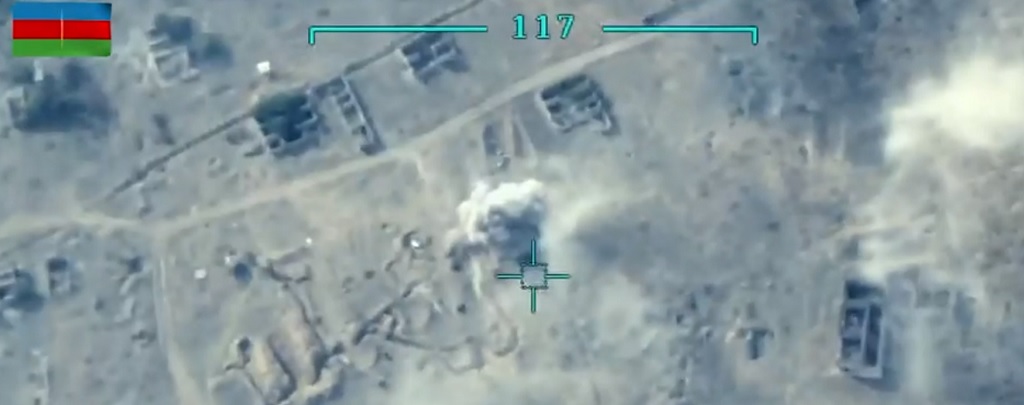President Reuven Rivlin spoke on the phone to his Armenian counterpart Armen Sarkissian on Monday, amid anger in the capital Yerevan over Israeli arms sales to Azerbaijan as a border dispute between the countries flares.
Shortly after the call, Armenia’s Ambassador to Israel Armen Smbatyan told Armenian news site Factor.am that Yerevan was in talks with Jerusalem and believes weapons sales could be halted in the coming days.
“I think that in this situation, Israel will stop supplying weapons to Azerbaijan. We are cooperating with the Israeli Foreign Ministry, there are certain people in the presidency, there are people who have influence.
“In two or three days they seem to be on the way to stopping the supply of weapons… I was given a verbal promise,” he said.
In the phone call between presidents, Rivlin “expressed his sorrow at the outbreak of violence between Armenia and Azerbaijan in the Nagorno-Karabakh region and at the loss of life on both sides,” a statement from his office said.
by email and never miss our top stories
“He added that the State of Israel has longstanding relations with Azerbaijan and that the cooperation between the two countries is not aimed against any side,” the statement added, in an apparent reference to Israel’s sale of military weapons to Baku.
“The president also noted that the State of Israel is interested in promoting relations with Armenia and is prepared to offer humanitarian aid, and that we welcome the opening of the Armenian embassy in Israel and hope that the Armenian ambassador will return soon,” Rivlin’s office said.

The phone call came four days after Armenia announced that it was recalling its ambassador from Israel due to Israeli weapon sales to its bitter enemy Azerbaijan, against the backdrop of heavy fighting between the two nations over the disputed region of Nagorno-Karabakh.
The ongoing clashes represent the biggest escalation in years of a decades-old conflict that has killed dozens and left scores of others wounded.
The Armenian ambassador was recalled to protest what an Armenian foreign ministry spokeswoman called “Israel’s supply of ultra-modern weapons to Azerbaijan.”
The Israeli Foreign Ministry released a statement in response saying it regretted the Armenian decision and that “Israel attaches importance to our relations with Armenia, and because of this sees the Armenian Embassy in Israel as an important tool for promoting the benefit of both peoples.”
Armenian foreign ministry spokewoman @naghdalyan: “For us, Israel’s supply of ultra-modern weapons to Azerbaijan is unacceptable, especially now, in the conditions of Azerbaijan’s aggression with the support of Turkey”
— Barak Ravid (@BarakRavid) October 1, 2020
Israel and Azerbaijan enjoy security and import agreements and it is speculated that Israel supplies 60 percent of the Azerbaijani military’s armaments, while Azerbaijan supplies a large amount of natural fuel to the Jewish state.
The Azerbaijani military has been using Israeli-made attack drones — including loitering munitions, or “kamikaze drones” — during the recent uptick in violence with Armenia, Hikmet Hajiyev, assistant to the president of Azerbaijan, said in an interview with Israel’s Walla news site Wednesday.
Hajiyev lauded the effectiveness of the Israeli weapons.
The Azerbaijani Ministry of Defense then released several videos showing drones in action against Armenian forces.

The fighting in Nagorno-Karabakh erupted last Sunday and has continued despite mounting calls for a ceasefire from around the globe.
Azerbaijan’s Defense Ministry said Armenian forces started shelling the town of Tartar last month, damaging “civilian infrastructure” and wounding people, while Armenian military officials reported that Azerbaijani forces were bombing positions of the Nagorno-Karabakh army in the north of the war-torn region.
Nagorno-Karabakh lies within Azerbaijan but has been under the control of ethnic Armenian forces backed by the Armenian government since 1994, at the end of a separatist war following the breakup of the Soviet Union three years earlier.
AP contributed to this report.

As The Times of Israel’s political correspondent, I spend my days in the Knesset trenches, speaking with politicians and advisers to understand their plans, goals and motivations.
I’m proud of our coverage of this government’s plans to overhaul the judiciary, including the political and social discontent that underpins the proposed changes and the intense public backlash against the shakeup.
Your support through The Times of Israel Community helps us continue to keep readers across the world properly informed during this tumultuous time. Have you appreciated our coverage in past months? If so, please join the ToI Community today.
~ Carrie Keller-Lynn, Political Correspondent
Yes, I’ll join
Yes, I’ll join
Already a member? Sign in to stop seeing this

We’re really pleased that you’ve read X Times of Israel articles in the past month.
That’s why we started the Times of Israel eleven years ago – to provide discerning readers like you with must-read coverage of Israel and the Jewish world.
So now we have a request. Unlike other news outlets, we haven’t put up a paywall. But as the journalism we do is costly, we invite readers for whom The Times of Israel has become important to help support our work by joining The Times of Israel Community.
For as little as $6 a month you can help support our quality journalism while enjoying The Times of Israel AD-FREE, as well as accessing exclusive content available only to Times of Israel Community members.
Thank you,
David Horovitz, Founding Editor of The Times of Israel
Join Our Community
Join Our Community
Already a member? Sign in to stop seeing this
